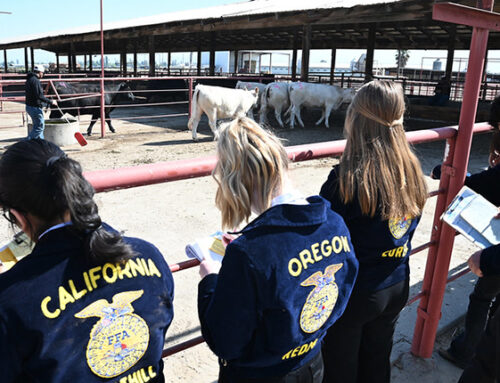California State University, Fresno is one of 18 nursing programs in the state and one of two in the San Joaquin Valley to receive state funding that would increase the healthcare workforce by expanding registered nurse education programs.
Fresno State received a two-year $364,947 award from the $2.7 million announced Feb. 15 by the Office of Statewide Health Planning and Development’s Song-Brown Program. Fresno State will use the award to train 20 additional students in the undergraduate nursing program and to increase the number of nursing faculty in the Valley.
“The funds will facilitate access to our Clinical Nurse Specialist/Nurse Educator master’s program via Web-based delivery,” said Dr. Michael Russler, chair of the Nursing Department at Fresno State. It will ultimately prepare the next generation of faculty for all nursing programs in the San Joaquin Valley.”
Fresno State graduates more than110 registered nurses each year, 85 percent of whom stay in the Valley and help address the growing health needs of communities.
Funding for the nursing faculty component will build upon an existing nurse education training program that helps to alleviate the region and state’s nursing shortage crisis by preparing students to become nurse educators. In 2006, a partnership of four nursing programs in the Valley began working collaboratively to improve and increase the number of nursing faculty. This partnership has now expanded to include all 10 nursing programs in the region. Each program nominates three students for every nurse education training course that is offered.
Song-Brown funding will complement the existing program by helping to support extended education fees for a three-unit course that will be offered to 80 students nominated by the Valley nursing programs. The funding will also support the development of a new course on teaching with technology, which will be added to Fresno State’s Clinical Nurse Specialist/ Nurse Educator post baccalaureate program, transitioning it to a 12-unit online Nurse Educator Certificate Program. The funding will enable faculty to teach the four courses online.
“Since the nurse education training program began, 67 students have completed the 2-unit course and 60 of them are working as nursing faculty members,” explained Dr. Mary Barakzai, director of the Central California Center for Excellence in Nursing at Fresno State.
Recent funding also will support the development of a network of current nursing faculty to serve as master teacher mentors throughout the Valley for students in the Nurse Educator Certificate Program.
The Central California Center for Excellence in Nursing addresses the region’s nursing shortage through research, policy, promotion of advanced nursing education and practice, and collaboration with regional nursing leadership and interests.
“With the financial support from agencies such as the Office of Statewide Health Planning and Development, the center is able to collaboratively provide long-term solutions and support for the region’s efforts in addressing the growing shortage of nurses,” said Barakzai.
For more information, contact Brandie Campbell at: 559.278.7940 or 559.994.3189.
Related links:
College of Health and Human Services www.csufresno.edu/chhs
Department of Nursing
www.csufresno.edu/nursing
Central California Center for
www.centralcalifornianursing.org
<http://www.centralcalifornianursing.org/>
Excellence in Nursing
Sen. Scott introduces bill to OK Doctor of Nursing programs in CSU
Addressing the growing need for nurses in California, State Senator Jack Scott (Pasadena/Glendale) has introduced Senate Bill 1288 (SB 1288). The bill would authorize the California State University (CSU) to award independently the Doctor of Nursing Practice (DNP) degree to train nurses for advanced nursing practice and prepare faculty to teach in postsecondary nursing education programs.
California has a critical need for more nurses in its workforce. In September 2007, the California Board of Registered Nursing forecasted that the state faces a registered nurse shortage of up to 59,000 full-time equivalent RNs in 2007.
“This bill combined with CSU’s ability to design comprehensive curricula in all areas would enable California to provide students access to affordable, well taught, and high quality nursing programs without requiring them to go out of state or to private institutions,” said Senator Scott.
SB 1288 would train future CSU, University of California, and California Community College faculty, which will add significantly to the total of nurses who are qualified to teach in the state. In 2006, the American Association of Colleges of Nursing (AACN) found that 42,866 qualified applicants were turned away from baccalaureate and graduate nursing programs due primarily to a lack of nurse educators and scarce funding. The UC supports CSU’s efforts in meeting this need.
Senator Scott’s groundbreaking legislation SB 724 (Chapter 269; 2005)enabled the CSU to launch independently last fall the Doctor of Education.
“Senator Scott is a visionary for higher education and he continues to author bills that specifically and effectively address the state’s educational needs now and in the future,” said CSU Chancellor Charles B. Reed. “The bill will greatly increase the supply of students enrolled in nursing graduate programs, and the faculty that teach in postsecondary nursing programs. This is critical since we’re expecting a significant number of faculty retirements in nursing programs.”
For more information contact Paul Browning at pbrowning@calstate.edu or Clara Potes-Fellow at cpotes-fellow@calstate.edu in the CSU Public Affairs Office, 562.951.4800.



